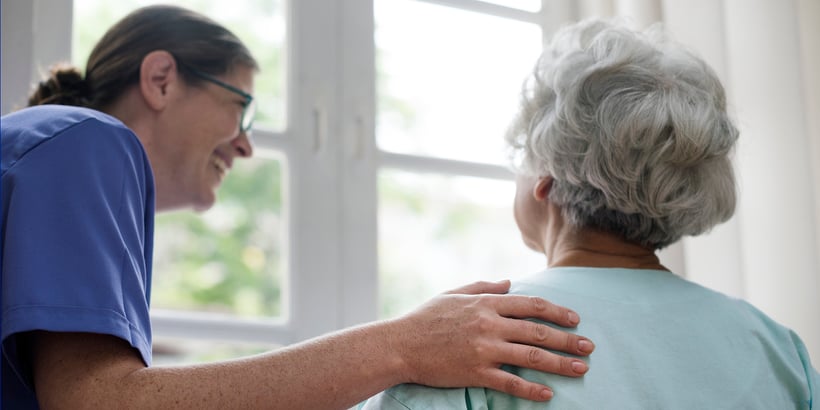
What is one of the most important things to do after your loved one gets discharged from the hospital? Make a follow-up appointment with their primary care physician, according to the medical experts at Northern Arizona Healthcare.
As a hospital discharge nears, it’s incredibly common for family caregivers to feel overwhelmed and rushed. There are many things on your plate — connecting with the discharge planner, determining what care is needed after discharge, possibly researching care facilities, creating a written discharge plan.
Unfortunately, not all hospitals are able to spend enough time adequately preparing you to take over your loved one's care. It can be easy to forget what needs to be discussed. That’s why making a follow-up appointment with your loved one’s doctor after they get discharged from the hospital is so important.
Here are four ways a primary care physician can help you care for your loved one after a discharge from a Flagstaff hospital or emergency room.
1. Keep Everyone Informed
Nearly one-third of older adults visit at least five different doctors each year. Their primary care doc — the one who usually refers to specialists and coordinates all the care — is an essential member of the team that helps their older patients stay healthy.
It’s important for your loved one’s primary care physician not only to know the reason for the hospitalization or emergency visit but also what happened in the hospital.
2. Understand Test Results
Whether your loved one experiences a heart attack or a fall, or they are admitted to the hospital to undergo surgery, it’s likely that tests were performed in the hospital. Depending on the length of your loved one’s hospital stay or ER visit, you might have received some test results back, however, it’s possible that not all results were in yet by the time of their discharge.
It’s important that you review all test results with their primary care physician to ensure that you understand the results and that nothing is missed.
3. Review Medication Changes
Medication errors can be dangerous. After a hospital stay, it is essential that your loved one’s primary care doctor does a thorough review of their prescriptions, comparing pre-hospitalization meds with post-discharge meds to be certain there are no duplications, omissions, harmful side effects, or drug interactions.
Ask about any new prescription drugs, over-the-counter drugs, vitamins, and herbal supplements, and ask the doctor if your loved one should continue taking the drugs, vitamins, or supplements they took before they were admitted. Sometimes new or added medications prescribed at discharge, such as blood thinners, need to be monitored. It’s also common for there to be dosing changes on prehospital medications, which will also require monitoring.
Here are some questions you can ask your loved one’s doctor to help reconcile their medications:
- Why is this medicine prescribed? How does it work? How long will the medicine need to be taken?
- How will we know that the medicine is effective?
- Will this medicine interact with other medications, prescription and nonprescription, or herbal preparations that my loved one is taking now?
- Should this medicine be taken with food? Are there any foods or beverages to avoid?
- Can this medicine be chewed, crushed, dissolved, or mixed with other medicines?
- What possible problems might we experience with the medicine? At what point should we report these problems?
- Will the insurance program pay for this medicine? Is there a less expensive alternative?
- Does the pharmacy provide special services such as home delivery, online refills, or medication review and counseling?
4. Get a Checkup
One of the best ways to reduce the likelihood that your loved one will be readmitted to the hospital is to make an appointment with their primary care doc for a simple checkup to see how they’re doing and ensure there aren’t any complications.
For example, their doctor might check their vital signs or complete follow-up blood work. If your loved one was in the hospital for pneumonia, their doctor might check how they are breathing. If it was a blood pressure issue that brought your loved one to the hospital, their doctor might check their blood pressure reading. Or if it were a kidney problem, their doctor might do another blood test to see if their kidneys are recovering. If your loved one has diabetes, their doctor will likely want to check their blood sugar levels.
A checkup is a great time to ask about anything else, including any remaining important questions you have about your loved one’s condition and care, as well as updating the doctor on anything that has happened in life since your loved one’s last visit.
Mention any changes either of you has noticed in appetite, weight, sleep, or energy level. Also, don’t be afraid to let the doctor know about any major changes or stresses in your family’s life, such as the death of a loved one. You may want to encourage your loved one to say something like: “It might be helpful for you to know that my sister passed away since my last visit with you,” or “I recently had to sell my home and move in with my daughter.”
Encourage your parents to ask questions, too. Asking questions is key to good communication with a doctor. Tell your loved one to not hesitate to ask questions if they don’t know the meaning of a word such as “aneurysm” or “hypertension” or when instructions aren’t clear. For instance, you might say, “I want to make sure I understand. Could you explain that a little more?” or “I did not understand that word. What does it mean?”
For more tips, articles, guides, checklists, and more, join our mailing list. You’ll get things like advice for family caregivers, checklists to help you stay organized, and information about living in Flagstaff delivered right to your inbox.





